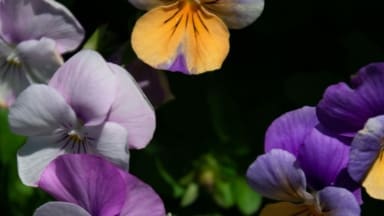
The study conducted by the French National Centre for Scientific Research (CNRS) and the University of Montpellier in France, found that as reproduction by ever depleting numbers of insects becomes more difficult, plants are evolving towards self-fertilisation.
Scientists compared field pansies growing in the Paris region today with pansies from the same localities resurrected in the laboratory from seeds collected between 1992 and 2001. They found that today’s flowers are not only 10% smaller, but they also produce 20% less nectar and are less visited by pollinators than their ancestors. The research indicates that plants are changing their reproduction strategy. If the flowers are not likely to attract insects for pollination, the plant is effectively wasting vital energy to make them large and nectar-rich.
This evolution is thought to be the result of the decline in pollinators across Europe and could result in a vicious circle where less nectar will be available for insects, potentially accelerating their decline. A study conducted in Germany in 2017, estimated seasonal decline of 76% and mid-summer decline of 82% in flying insect biomass.
The study highlights the importance of safeguarding both plants and pollinators, which have co-existed for millions of years.
Further reference:
- Ongoing convergent evolution of a selfing syndrome threatens plant-pollinator interactions, Samson Acoca-Pidolle, Perrine Gauthier, Louis Devresse, Antoine Deverge Merdrignac, Virginie Pons, Pierre-Olivier Cheptou, New Phytologist, December 20, 2023
- More than 75 percent decline over 27 years in total flying insect biomass in protected areas, Caspar A. Hallmann, Martin Sorg, Eelke Jongejans, Henk Siepel, Nick Hofland, Heinz Schwan, Werner Stenmans, Andreas Müller, Hubert Sumser, Thomas Hörren, Dave Goulson, Hans de Kroon, October 18, 2017
- Flowers ‘giving up’ on scarce insects and evolving to self-pollinate say scientists, Phoebe Weston, The Guardian, 20th December 2023

